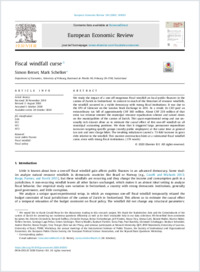Fiscal windfall curse
BP2-STS
- Berset, Simon University of Fribourg
- Schelker, Mark ORCID University of Fribourg
- 2020
Published in:
- European Economic Review. - Elsevier BV. - 2020, vol. 130, p. 103592
English
We study the impact of a one-offexogenous fiscal windfall on local public finances in the canton of Zurich in Switzerland. In contrast to much of the literature of resource windfalls, the windfall occurred in a stable democracy with strong fiscal institutions. It was due to the IPO of Glencore on the London Stock Exchange in 2011. As a result, its CEO paid an extraordinary tax bill of approximately CHF 360 million. About CHF 238 million of that extra tax revenue entered the municipal resource equalization scheme and rained down on the municipalities of the canton of Zurich. This quasi-experimental setup and our un- usually rich dataset allow us to estimate the causal effect of this one-offwindfall on all municipal accounting positions. We show that it triggered large, permanent expenditure increases targeting specific groups (mostly public employees) at the same time as general tax cuts and user charge hikes. The resulting imbalances caused a 7.5-fold increase in gross debt relative to the windfall. This massive overreaction hints at a substantial fiscal windfall curse, even with strong fiscal institutions.
- Faculty
- Faculté des sciences économiques et sociales et du management
- Department
- Département d'économie politique
- Language
-
- English
- Classification
- Economics
- License
-
Rights reserved
- Open access status
- green
- Identifiers
-
- DOI 10.1016/j.euroecorev.2020.103592
- ISSN 0014-2921
- Persistent URL
- https://folia.unifr.ch/unifr/documents/324873
Statistics
Document views: 114
File downloads:
- bersetschelkereer2020fiscalwindfallcurse: 341
